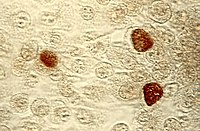
Photo from wikipedia
Chlamydia trachomatis is the leading cause of bacterial sexually transmitted infection, and is responsible for a range of chronic and severe reproductive outcomes. The ability of Chlamydia to cause chronic… Click to show full abstract
Chlamydia trachomatis is the leading cause of bacterial sexually transmitted infection, and is responsible for a range of chronic and severe reproductive outcomes. The ability of Chlamydia to cause chronic infection is linked to unique mechanisms associated with chlamydial pathogenesis: Chlamydia’s obligate intracellular nature, its ability to evade host immune responses, and its reversible conversion into ‘persistent’ developmental forms. The past decade of Chlamydia research is marked by groundbreaking advances in genetic manipulation of Chlamydia, which in turn has catalyzed our mechanistic insight into C. trachomatis host adaptation and pathogenesis. Our recent progress will be discussed, along with the resulting new understanding obtained in the areas of chlamydial virulence factors, immune evasion strategies, persistence, and dissemination. Finally, I will discuss emerging areas of research in C. trachomatis infections, including the role of the microbiome, rectal infections, tissue resident memory T cells, drug treatment failures, and the short- and long-term prospects for treating Chlamydia infections. Disclosure No significant relationships.
Journal Title: Sexually Transmitted Infections
Year Published: 2019
Link to full text (if available)
Share on Social Media: Sign Up to like & get
recommendations!